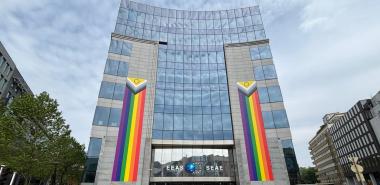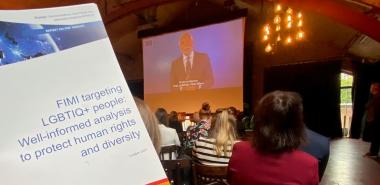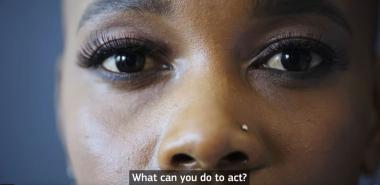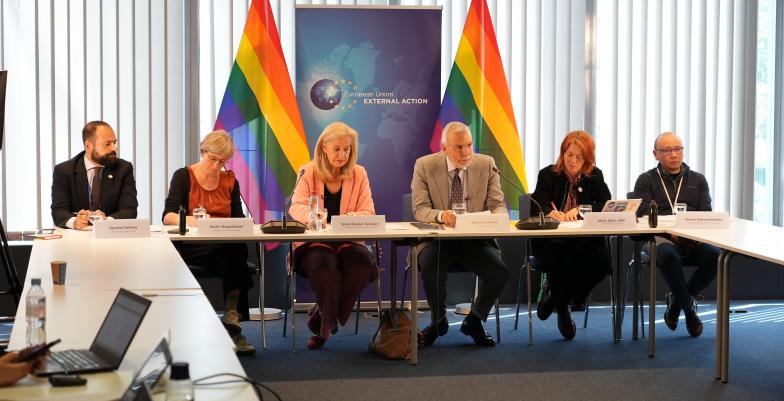LGBTIQ+
Navigate the topic
United in Diversity
Equality and non-discrimination are part of European Union’s core values, as emphasized in the Universal Declaration of Human Rights, the European Treaties, and the EU Charter of Fundamental Rights.
LGBTIQ+ persons still face multiple challenges worldwide and action is needed to combat it. Promoting equality, diversity and inclusion is a matter of human rights, but also of peace and security, social justice and economic progress.
The EU is stepping up its actions to prevent, denounce and combat all forms of discrimination and violence against LGBTIQ+ persons, including hate speech and hate crimes online as well as offline. The EU actively condemns and combats discriminatory laws, policies and practices, including the criminalisation of consenting same-sex relations.
EEAS Agenda for Diversity and Inclusion 2023-2025
In addition to existing policies such as the EU Action on Human Rights and Democracy 2020-2024, which includes step up actions for LGBTI persons, we launched the Diversity and Inclusion Agenda in February.
The Agenda’s central aim is to ensure a greater mainstreaming of equality, diversity and inclusion throughout EU external actions and it reiterates our commitment to combat discrimination on any ground by being proactive, persistent and vocal, including on rights of LGBTIQ+ persons.
LGBTIQ Equality Strategy 2020-2025
The intersectional perspective has formed our policy framework on equality. The first ever LGBTIQ Equality Strategy 2020-2025 puts forward concrete actions to mainstream LGBTIQ+ equality into all policy areas.
Particular attention is paid to the most vulnerable, including trans- and intersex people. The EU always aims to lead by example, and the aim of the strategy is to build a Union of Equality, where diversity and inclusion are promoted and protected, and where people can be themselves, love who they want, without the risk of discrimination, exclusion, hatred or violence.
Leading by example requires that we also work internally within our EU institutions to combat discrimination, to ensure coherence between our internal and external action.
EU’s action abroad
Externally, the European Union is committed to promote and protect the universality of human rights around the world by using all tools – diplomatic, financial and other – and through mobilising partnerships at bilateral and multilateral levels.
The protection of LGBTIQ+ persons has been raised during our Human Rights Dialogues and other dialogues in the past with numerous countries. In addition, in our annual Human Rights reports, we also present our analysis of national and global contexts.
Mainstreaming LGBTIQ equality in humanitarian action
The Commission mainstreams LGBTIQ equality into its humanitarian action. It makes sure that the EU humanitarian aid is adapted to the needs of different groups, including LGBTIQ persons and individuals, and in line with humanitarian principles, including that of impartiality (non-discrimination).
The EU has, among other actions, funded safe protection projects and services targeting LGBTIQ+ populations in Türkiye.
Multilateral fora
At the multilateral level, the EU supports and collaborates with the independent expert on Sexual Orientation and Gender Identity (SOGI). Our EU Delegation in New York is part of the UN LGBTI Core Group.
Looking ahead, the UN Secretariat plays a key role in advancing rights of LGBTIQ+ persons and we count on UN Secretary General’s leadership. We particularly hope progress can be made on the UN system-wide strategy on rights of LGBTIQ+ persons.
Collaboration with Civil Society Organisations (CSO)
The EU also works closely with civil society organisations worldwide, as their role is paramount in helping the EU get a better grasp of situations on the ground.
The EU is among the top donors worldwide to support LGBTIQ+ civil society organisations and Human Rights Defenders in emergency situations. Since the launch of the EU Human Rights Defenders mechanism, more than 8,980 different LGBTIQ+ rights defenders and grassroots LGBTIQ+ rights communities have received direct, comprehensive support through emergency grants and funding to local initiatives.
The EU supports civil society organisations and human rights defenders in their efforts to protect and advance the human rights of LGBTIQ+ persons through funding under the Instrument for Pre-Accession Assistance (IPA) and the Thematic Programme on Human Rights and Democracy of the Neighbourhood, Development and International Cooperation Instrument (NDICI).
In particular, EUR 15 million have been earmarked for the promotion of equality, inclusion and diversity under the Thematic Programme on Human Rights and Democracy 2021-2027 of the NDICI instrument.
Combating Foreign Information Manipulation Interference (FIMI)
Protecting human rights of LGBTIQ+ persons in foreign policy also means combatting anti-LGBTIQ+ narratives. Therefore, as part of our work on fighting Foreign Information Manipulation and Interference (FIMI), including disinformation, the EEAS has developed a standardised methodology to collect, analyse and document cases that can help to better understand the threat and help communicators and policy-makers to design better-informed responses from different stakeholders to this type of threats.
The methodology relies on the standardised behavioural analysis of individual cases. The aggregation of cases will help us to understand the attack patterns of perpetrators and extract trends and comparisons between regions and threat actors.
In 2023 we published a well-informed analysis to protect human rights and diversity on FIMI targeting LGBTIQ+ people. The report is the first such document focused on the topic of FIMI targeting solely LGBTIQ+ persons, and it includes specific FIMI cases.










